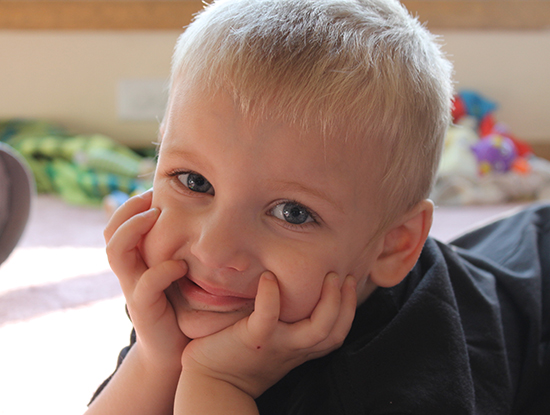Kelly Thibodeau is tired. She is currently working as a nurse’s aid and just got accepted to nursing school. After working a late shift, she doesn’t get home until after midnight. Her husband has already put 3 of their 4 children to bed, except for Bryce. Bryce is their third-born son. He isn’t even 3 years old yet, but he is still wide awake when Kelly gets home. He can’t sleep unless he’s in bed with his parents. Even then, he only sleeps for at most 4 hours a night. Kelly and her husband, Brandon, haven’t had their bed to themselves in nearly 3 years. This is just one of the many symptoms that go with Bryce’s rare genetic disorder.
Bryce was born on June 12, 2011 in the small town of Waseca, MN. During his first year, he developed like a typical healthy baby. He hit most of the standard milestones, such as crawling, walking, and baby babbling with no problem. However, whereas most babies are able to sleep through the night at around 9 months, at 13 months Bryce wasn’t sleeping at all. In a 24-hour time period, Bryce would get maybe 2 hours of sleep. And that’s including naps during the day. When Kelly confronted her doctor, he said it was a behavioral issue that the parents could train.
Over the months, Kelly and Brandon tried everything the doctor suggested. Nothing seemed to work for Bryce. He always climbed into bed with his parents and slept very little, if at all. Despite his initial baby babbling, he remained nonverbal. This went on for over 2 years. By October 2013 it was apparent that his issues were not behavioral. They began genetic testing. Bryce went through labs, MRIs, ultrasounds, sleep studies, speech evaluations, and hearing evaluations. He had surgery to remove his adenoids and tonsils to try and help with sleep apnea, as well as other numerous tests.
In January 2014, the results of the genetic testing finally came in. Bryce was diagnosed with a rare genetic disorder called Phelan-McDermid Syndrome. He is approximately 1 of only 1000 people in the world to be diagnosed. Symptoms of the genetic disorder include intellectual disabilities, sleep disorders, and seizures. Most children with Phelan-McDermid Syndrome have moderate to severe delays and often do not develop functional language. They may also have behavioral issues that stem from autism or autistic-like behaviors.
“Bryce is the most fun loving little boy. He has a big heart and dislikes when people cry, get hurt, or are sad,” Kelly explains. He watches “Thomas the Tank Engine” and funny YouTube videos on a daily basis. He loves water and looks forward to his daily bath. He’s a picky eater who only likes nuggets and peanut butter sandwiches. He has a contagious giggle that can be heard whenever he bounces around on a trampoline.
However, it is difficult for Bryce to communicate because he’s nonverbal. With Phelan-McDermid Syndrome, he has severe meltdowns. He throws tantrums when he can’t explain himself. The tantrums can last for short or long periods of time. It is stressful on the family. They can’t go anywhere because they don’t know how Bryce will react.
The numerous doctors visits and expensive tests have been costly for the Thibodeau family. The lack of sleep for the past 3 years due to Bryce’s disorder has taken a physical toll. They are exhausted. They need relief. And no one brings relief like the Chivers. Today, Chive Charities is providing Bryce’s family with an $11,500 grant from the Chive Fund. The grant is going toward physical and speech therapy equipment, as well as something exciting we have never done before.
Meet Bryce…






